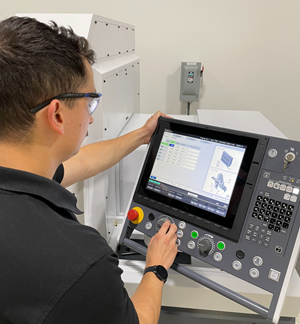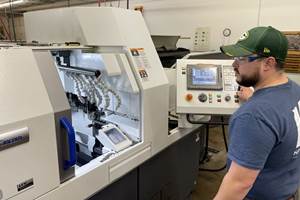Managing Cutting Tool Resources Through Shopfloor Connectivity
A manufacturer of cutting tool measuring equipment says that by using the data already available from devices such as tool presetters and vending systems, shops can easily establish an effective “smart” tool management system.
Share





Interconnectivity is important in establishing smart manufacturing environments in which the data shared between disparate pieces of equipment improves the speed of jobs through even simple process improvements. I learned Zoller’s philosophy while attending an open house at its U.S. center of operations in Ann Arbor, Michigan. At the event, the company invited customers into its new Industry 4.0 Technology Center to demonstrate its measuring systems and interconnected tool-storage solutions. The event included product displays and demonstrations of presetting and inspection machines as well as speeches by Zoller President Alexander Zoller and General Manager Dietmar Moll. While the speeches briefly touched on the capabilities of the measuring equipment, their main focus was on how the company’s Tool Management Solutions (TMS) Gold software facilitates data sharing across machines.
Zoller realized this interconnected approach to manufacturing by expanding on its presetting machines, which provide measurements of the length, diameter and complex cutting tool geometries. The company already had many other offerings (heat-shrinking solutions, automated inspection solutions, machines capable of complex DXF comparison and more), but it realized that the presetting machines generated data that could be useful in other applications. The presetters create “digital twins” of the tools they measure, which the company has used in secondary processes such as creating tool profiles for CAM programmers to run more accurate simulations of tool paths. In another application, the TMS software uses the digital twins to keep an accurate accounting of a shop’s tools, including their number, condition and location in the shop. Using simple inputs attached to tool-vending machines and cabinets, the shop can keep track of who has which tool, and management will have ample notice when inserts are running low.
While the company has been dedicated to metrology for decades, the development of the tool-vending and storage solutions is not a change of direction, Mr. Zoller says. “Our measuring and presetting devices were already recording most of this data for our customers,” he says. “With our vending and tool-management solutions, we are able to put this data to new use to improve our customers’ shopfloor experience.” The company simply saw that its machines were taking in useful information, and expanded its offerings to put that information to use. This is the heart of data-driven manufacturing.
Oftentimes, people hear the term “data-driven” and picture endless charts and spreadsheets filled with minute details on every metric possible to retrieve from a machine tool, but Zoller demonstrates that data-driven manufacturing is the simple act of gathering information that is truly valuable and putting it to use in your shop. Machine metrics are certainly important, but so is knowing something as simple as how many carbide end mills are in stock before placing an order for more.
By using the digital twins created by its measuring devices in other applications, the company is embracing the essence of Industry 4.0: translating digital knowledge into real time savings on the shop floor. In this case, the software makes keeping track of tooling simple, and by eliminating the process of hunting down cutting tools from the workflow, the software is able to reduce the time between finishing CAM programming and starting up the machine tool to 20 minutes. Not all data in data-driven manufacturing is about the performance of the machine tool. Sometimes, the shop finds savings in improving the experience of its people.
Related Content
Swiss-Type Control Uses CNC Data to Improve Efficiency
Advanced controls for Swiss-type CNC lathes uses machine data to prevent tool collisions, saving setup time and scrap costs.
Read MoreThe Power of Practical Demonstrations and Projects
Practical work has served Bridgerland Technical College both in preparing its current students for manufacturing jobs and in appealing to new generations of potential machinists.
Read MoreCutting Part Programming Times Through AI
CAM Assist cuts repetition from part programming — early users say it cuts tribal knowledge and could be a useful tool for training new programmers.
Read MoreERP Provides Smooth Pathway to Data Security
With the CMMC data security standards looming, machine shops serving the defense industry can turn to ERP to keep business moving.
Read MoreRead Next
How I Made It: Dennis Rymanowski
Dennis Rymanowski has worked at NSH USA for 60 years, with his passion for manufacturing living alongside his passion for his family’s polka band.
Read MoreA New Frontier in Surface Finish Control
What if your machine tool could measure surface roughness as it cuts? This article explores how in-process metrology is advancing from concept to reality, enabling real-time feedback, immediate detection of anomalies and new levels of control over surface quality. Discover the technologies making this possible.
Read More























